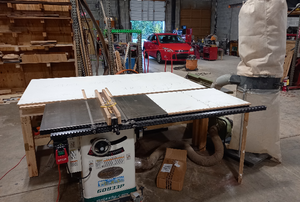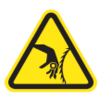Grizzly Table Saw
Zone
Equipment \ Warehouse \ Woodshop
About
A table saw is a woodworking tool consisting of a circular saw blade, mounted on an arbor, that is driven by an electric motor (either directly, by belt, or by gears). The blade protrudes through the surface of a table, which provides support for the material, usually wood, being cut.
Owner(s)
- Freeside
Hackability
Do Not Hack. Alert BoD or president if the saw is damaged or in a dangerous state. Repairs and modification require permission.
Permissions
For general use by members after they have completed an appropriate training course. Treat this equipment as if it were your own cleaning items off of the top of the machine and around its table after usage.
Restrictions
Do not use the table saw to cut anything harder than wood or plastics. No aluminum, no steel, no matter how thin or soft.
Caution
Things a user should know prior to using the equipment:
Tips for using the table saw - http://www.woodcraft.com/Articles/Articles.aspx?articleid=317
Basic Instructions
1: Make sure dust collection tube inside saw is connected.
2: Set blade height as needed.
3: Adjust ripping fence use cutting sled.
4: Power on saw. Ensure dust collector is powered on.
5: Cut wood/plastic with saw keeping the material held tightly to the fence/sled. Use a push stick to avoid getting hands anywhere near the moving blade.
6: Once done, clean up any mess, dust, or offcuts.
7: Lower the blade below the table. Place ripping fence over blade to indicate saw is not in use.
Specifications and Detailed Instructions
[[File:RTFM.PNG|50px|link=https://cdn2.grizzly.com/manuals/g0833p_m.pdf]https://cdn2.grizzly.com/manuals/g0833p_m.pdf

![]() http://bcove.me/6k8vlh1x
http://bcove.me/6k8vlh1x
Tips
- Holding material flush with the table and squarely against the fence/ sled for straight clean safe cuts.
- If the suction sucks and sucking, empty the plastic bag and shake out the cloth bag. Make sure all the hoses are connected and not clogged.
Maintenance History
11/14/2021 (Ronnie/Dominic)
(Primary issue was difficulty raising and lowering height and broken dust collector)
1: Replaced the screw shafts for the blade height and angle adjustments.
2: Replaced one hand wheel that was broken where it holds onto the spring pin on the shaft.
3: Pulled the motor, belt, dust guards, dust tube, and basically anything that can be unbolted from the insides of the saw apart, vacuumed and wiped out any wood flour we could reach, lubed anything that could be with graphite spray.
4: Replaced the spring pins on both shafts.
5: Modified the repaired handwheel to allow it to properly lock (ground the notch in it deeper).
6: Built a new dust collection automated power-on box. Wired it up to the saw and mounted it under the cabinet. It's a contactor relay that turns on power to the dust collector when the saw is on.
7: Cleaned up, modified, and rebuilt the dust collector with the somewhat smaller one that used to be used for fume extraction at old freeside on the laser cutter.
From here on, it should be part of buildout day to check that the insides of the saw are cleaned, the dust tube is in place, and that the parts of the blade height adjustment are lubed with graphite spray. This should keep it from getting all bound up and hard to adjust in the future.
Warnings





